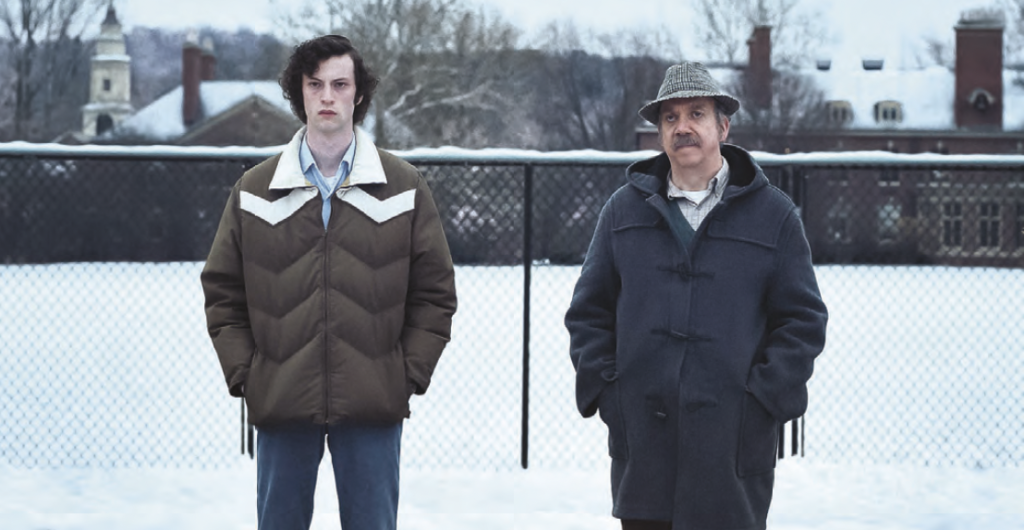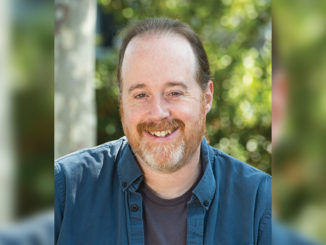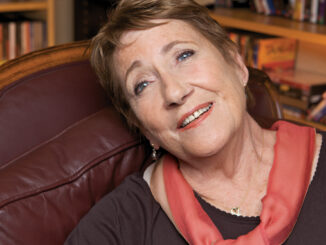
By Patrick Z. McGavin
“I like to say I found editing, and editing found me,” says Kevin Tent, ACE, the Oscar-nominated picture editor of Alexander Payne’s dark comedy “The Holdovers.”
Beginning with their first collaboration “Citizen Ruth” (1996), Tent has been the only editor for Payne, on such films as “Election” (1999), “About Schmidt” (2002) and “Sideways” (2004).
“The Holdovers,” set over Christmas vacation in 1970 at a New England boarding school for boys, is the bittersweet portrait of complicated relationships among a grumpy teacher with a troubled past (Paul Giamatti), his callow student (Dominic Sessa) and a long-suffering dining-hall cook (Da’Vine Joy Randolph). Tent talked about editing for tone, tempo and rhythm, as well as his efforts on behalf of picture editors as the president of ACE.
CineMontage: You have edited all of Alexander Payne’s films. How did you first meet?
Kevin Tent: We both lived in the same Silverlake neighborhood and knew the same group of people but had never met. I was an editor for Roger Corman, and I had done some art films. When he had his first feature ready to go, he asked our mutual friend, the editor Carole Kravetz, for a recommendation since, as he put it, he couldn’t afford her. She recommended two people, and I was one of them. We hit it off in an interview, I think he liked that I had worked at Roger Corman’s and I had also cut this independent film by Tamra Davis, “Guncrazy” (1992), that made a pop. We had challenges. “Citizen Ruth” (1996) was a low-budget film, and it was the first time he ever directed. We had a good time, worked hard and I think ultimately made a good movie. Alexander is a loyal director and person, and when he got his next film off the ground, “Election” (1999), he asked me to cut it. Anyone who had anything to do with that film had a huge career bump.

CineMontage: How has the creative dynamic evolved?
Kevin Tent: He keeps the filmmaking process in perspective, and he doesn’t let it consume his brain in a bad way. There’s pressure, but he remains cool. We just close the door and go to work. I don’t really think about what we do or how we do it. We just keep trying things. We both have radar or a spidey sense that warns us that something is not yet good. So we just keep cutting and experimenting. As he once said. “Every day we make this film suck less.” Those are really good words to live by in a cutting room.
CineMontage: Many of your films together, like “Citizen Ruth” and “Election,” have a very specific tone. They are comedies, but not typical ones. How do you capture that?
Kevin Tent: Yes, sometimes you’re laughing at very awkward or uncomfortable moments. Like many of his other films, the characters in “The Holdovers” are very well-drawn. They’re realistic in a sense that they are flawed, or maybe the better way to put it is: they’re “human.” And then he takes these realistic and relatable characters and puts them in situations. Often funny, awkward situations. I think the humor (for the audience) comes from watching these characters squirm. In the cutting room we are always looking for the most honest performances which are sometimes funny, sometimes not. The tone is in some ways baked into the film by the screenplay and Alexander’s directing, but we are certainly diligent in the cutting room of supporting whatever that tone is. We’re also cognizant of the transitions in the shifts of tone.
CineMontage: The premise of the story changes and narrows to just three people. How did you want to handle that?
Kevin Tent: It’s a great twist and an unexpected one for the audience. I think it’s a nice surprise for them when they realize, “Oh this is the movie we’re watching.” I was very happy to see they didn’t reveal it in the trailer. It’s a twist that comes like 45 minutes into the film, which is later than what’s more or less expected in today’s cinematic culture. Our attempt to handle this was to do our best to get the twist to happen as soon as we could with simple pacing and tightening. We really couldn’t get to the moment much earlier without dropping scenes, which kind of hurt the movie. It seems there was enough interesting stuff going on with the characters which kept the audience engaged till the rest of the boys left the school and the movie became about our three heroes.
CineMontage: The lead character played by Paul Giamatti has some affinities with Miles, his character from “Sideways” (2004). Twenty years apart, but you’re doing interesting variations and themes.
Kevin Tent: Paul is a phenomenal actor. Always delivers, always knows his lines, always matching his action, always giving great reaction shots to other actors’ reads. He’s hands down the editor’s best friend. He nailed this role.
CineMontage: You humanize him, but never soften him.
Kevin Tent: I think that is something we watch for in the cutting room, making sure moments never become too sentimental or saccharine. We wanted to be emotional, but not over the top.
CineMontage: What were the great challenges of weaving together these three blocks, or character tapestries?
Kevin Tent: Well, hopefully we were successful in juggling and balancing these three great characters. They all have a lot going on and we were cognizant of making sure they were represented fairly and equally. Where we really weave and bond them together is the Christmas party. I thought this was a really interesting series of scenes. I was worried that the party would feel like a big tangent to the audience and that we’d lose them. But there’s so much emotion going on for each character that I think the audience embraced the whole 10 to 12 minute sequence without disengaging. Angus has his first kiss, Mary grieves, and Paul sees his chances at love evaporate. All heavy stuff, with the backdrop of what should be a joyful evening.
CineMontage: In terms of shaping performance in the editing room, how has your approach evolved over the years?
Kevin Tent: In all honesty, I’m not sure we’ve changed our approach too much in shaping performances over the years. I mean, I guess our process has evolved some, or we’re more confident, but we’re basically doing exactly what we did on “Citizen Ruth.” Alexander gets great performances on the set, and once we have them in the cutting room, we just keep refining and experimenting. I would guess 80% of our cutting choices are guided by the performances we choose. Ever since “About Schmidt,” we’ve made a conscious decision to cut less, to let performances play out. If we can avoid interrupting a performance with a cut, we’ll do it. Not always easy, but that’s our initial goal when we start. We are both big believers in the power of a strong performance.
CineMontage: When the story shifts to Boston, did you alter the rhythm of the film?
Kevin Tent: That’s a good question. I’m not sure if we altered the rhythm or that we took the audience out of the claustrophobic confines of the school and put them on the road. We opened up the picture with driving shots, cityscapes and I think it was a breath of fresh air for them (the audience). The characters were doing more too, bowling, skating, Mary laughing with her sister, all three were more active. This with our music choices and I guess the pacing up of scenes probably makes it feel like we altered the rhythm.
CineMontage: Alexander Payne has directed some significant stars, like Jack Nicholson. Was that a different dynamic?
Kevin Tent: We don’t really think about the actor’s status when cutting. When he got Jack Nicholson for “About Schmidt,” that was a big deal. And I think he was a little intimidated at first, it being just his third film. But we approached his performance like all the rest and Jack was great. It was a thrill as an editor to work with his footage.
I remember when Jack’s very first dailies came in, it was a simple scene, with him on the phone with his daughter. Alexander had him do a number of takes. Jack was amazing, each take was great, and each one was different in subtle ways. It occurred to me then, “Jack’s worth every penny they’re paying him.”
CineMontage: You’ve also directed several narrative films, most recently “Crash Pad” (2017). How has that influenced your work as an editor?
Kevin Tent: I should clarify, I didn’t really direct any of those early Roger Corman movies. I was an editor who was hired to fix them. I would steal scenes (car chases, space wars, etc.) from Roger’s other movies and cut them into his troubled films. Trying to liven them up and make them less bad. For my sins I was awarded directing credits. I did direct a movie recently called “Crash Pad” in which I learned a lot. I have always respected directors immensely. Life on the set is intense. As editors we have it pretty good. We can sit there, sip our coffee, look at our takes, try things and if it doesn’t work try something else. The set is nothing but chaos and craziness. So my empathy for directors has only deepened from my experience directing.
CineMontage: How did a Buffalo kid like you wind up in Hollywood?
Kevin Tent: I loved watching movies as a kid but certainly wasn’t any kind of cinephile. I had no idea editing existed. I saw Bob Fosse’s “All That Jazz” however, and I look back at that as a possible spark of something. There’s a scene (starring our very own [MPEG President] Alan Heim [ACE]) where a producer comes to the cutting room and watches a new cut on a moviola. As he watches he becomes thrilled as the cut has gotten better. I remember thinking what happened there? Anyway… somewhere in my youth the vague notion of working in movies became enough that I packed my bags and moved to Los Angeles. I didn’t have a clue how or what I was going to do when I got here. I wound up going to LACC where I took an editing class and cut my own films. I was kind of hooked. And then… I got my first job cutting lame educational films. After doing that for a couple of years, I got a chance to re-cut a movie for Roger Corman and I’d have to say that’s where it all started coming together.
CineMontage: As the president of ACE, what are your goals for the organization, especially given the current state of the movie industry?
Kevin Tent: ACE is a great organization. Editors are the best people. I love them. They’re smart, they’re funny, they’re good people. Fortunately, we have an amazing and dedicated staff (led by Jenni McCormick and team) who run everything and make being President easy. It’s an exciting time at ACE. We’re really growing, both in the U.S. and internationally. As far as the future goes, I’d like to see us do more with education. We are actually taking steps to expand on that now. We’ll be seeing some exciting changes soon.
Patrick Z. McGavin is a Chicago-based film reporter and critic.





